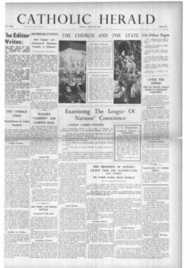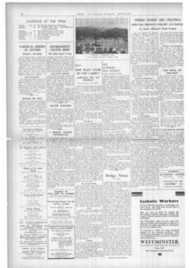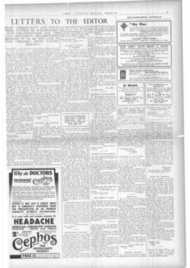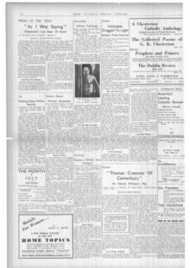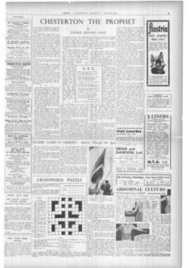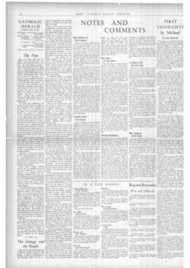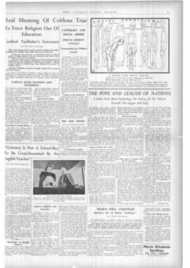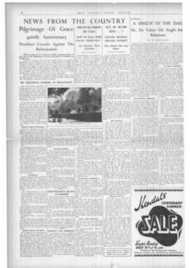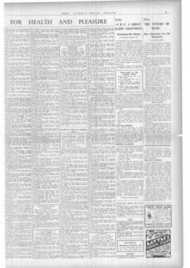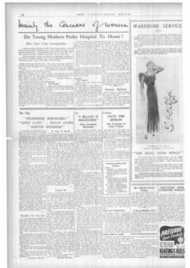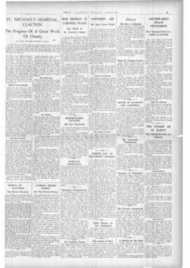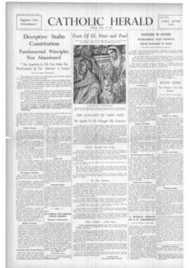Page 5, 26th June 1936
Page 5
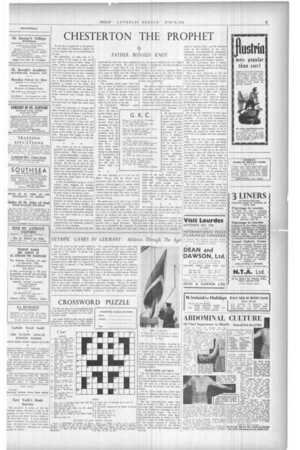
Report an error
Noticed an error on this page?If you've noticed an error in this article please click here to report it.
Tags
Share
Related articles
G K Chesterton Was Not An Anti-semite
Gkc Warmonger, Pacifist, Tory . .
Private And Public Writer
7
The Sacredness Of Laughter
CHESTERTON THE PROPHET
by FA7 HER RONALD KNOX
To all men of good-will in my generation, the death of Chesterton appears (in various degrees) like an overshadowing of the sun.
His philosophy, or some echo of it, gave colour to the things of this world, and wat the earnest of better things to come. Many others, like myself, must have been so saturated with his thought that every turn of the road has reminded us of him in these last few days, bringing with it a fresh ache of memory. (As we sat at luncheon after we had laid him to rest at Beaconsfield, I was trying to remember a couplet of his about the Saracen's Head, and found myself refusing, in his honour, a biscuit with my cheese.) This, even in small things; but there are deeper memories and a deeper sense of loss.
Our lives, and, salva religione, our faith had been built up round him more than we knew.
I read The Napoleon of Notting Hill when it came out, a school-boy just ready to take the impress of ideas; I read What's Wrong with the World when it came out, a young don in need of an attitude.
Since then, I doubt if I have ever said or written anything that pleased me without realising, then or later, that he had put it better; and I have, all my life, turned to his words for comfort as if to wine. The man who taught us that life was worth living, is dead; that is all that has happened.
You cannot get out of Chesterton's greatness by fulsome praise of his incidental qualities. When you have called him a genial philosopher, a daring poet, an inspired draughtsman, a polished wit, an honest journalist, you have said I nothing. He did not set store by any I of these talents; no one could have used
• them more light-heartedly—you might almost say, more amateurishly; he cared always about the thing he was saying, not about the rough vigour of the way in which he said it.
A fine old gentleman going in to bat without pads, slogging the bowling without regard to style, and not minding how many catches he nearly gave, would be some image of his literary poise.
Or think of him as the defender of a fortress, throwing down tiles, hammers, jam-pots, no matter what as long as he makes sure of throwing straight; so Chesterton would write an incidentally inspired ballad, an incidentally thrilling play, an incidentally marvellous detective story—any stick would do to beat the Enemy with.
For he was neither poet nor critic nor romance-writer nor journalist, primarily at least; he was a prophet.
I am astounded to see how little that
much-abused word has been employed in assessing his worth. No room for definitions; I mean that he can be regarded as a prophet of his time in the same sense in which men like Voltaire or Carlyle or Ruskin were regarded (with whatever justification) as prophets of theirs.
The prophet stands apart from his age, yet must be studied in connection with it; usually because he is formed, in part at least, by reaction from it— Blake is an obvious though violent example. He sees, or thinks he sees, aspects of eternal truth thrown into relief by the errors of his day.
His main message, as it is set out in What's Wrong with the World, was concerned with the family, with private property, with the dignity of woman, with the personal freedom of man. True revolution—it is the teaching of " Manalive " —must bring the wheel full circle, so that you get back to where you were before you went wrong.
His genius was to be able to see in the commonest things of life a parable of the eternal truths he apprehended. Thus, he will point out how the older tools, a fire or a stick or a knife, have manifold uses, whereas the modern ones may be better adapted for a particular purpose, but are fatally specialised; you cannot defend yourself with a pencil sharpener. How many of us remember that argument the other day, when we discovered that sane tions, our patent substitute for war, might hamper a belligerent, but had no efficacy against a victor?
I have never had an argument which threatened to get to the root of things without finding myself tempted at some point to fall back on the phrase, " Chesterton says somewhere."
But because religion touches us nearer than either politics or philosophy, his chief influence will remain not political or philosophical but religious. He challenged the doubting age of his youth, the shoulder-shrugging age of his maturer life, with the double claim that religion was worth bothering about, and that theology was sensible.
He had that kind of mysticism which could read all the rigours of theology into a common tale of human experience and human emotions; if you w ill, a detective story. And what made his approach all the more original was that he had made the discovery of Catho1 i cism, piecemeal, f o r himself. He would have said, t h e rediscovery; conversion to him was (like everything else worth having) a " revolution," a return to the faith which his godfathers and godmothers ought to have taught him. " The whole world turned over and came upright, and I came out where the old road shone white " ; he had returned to a home he had never been in before. He had sailed uncharted seas, to recognise, in the barbaric temple of the strange country where he landed, the Pavilion at Brighton.
No convert ever fitted into the Church more snugly; his last perplexity about it was removed when, a few years later, Mrs. Chesterton joined him.
That his writing and work became less effective when he became a Catholic will be said of him, as of many others. It was partially true; he had arrived at the age when a man falls back on criticism in
stead of creative work, and the demands made on his kindness by our overorganised, over-sectionalised community encroached on his leisure. G.K.'s Weekly was an added, self-imposed burden; a tribute of piety to his brother's memory.
But The Everlasting Man is almost certainly the greatest thing he wrote, and some of his best biographical work belongs to the same period.
What is more important is that his works were Catholic long before he was. In The Ball and the Cross (1910) his hero
was a Catholic; and he nailed his colours to the mast with Father Brown.
His conversion to the Faith gave him a more precise line of territory to defend, brought him into conflict with a more pettifogging type of adversary. " David was shut up in a hold," where he longed for 'a draught of water from the well at Bethlehem, looking back wistfully, perhaps, at the days when he went out to meet the giant, armed with five smooth stones from the brook.
So, it may be, Chesterton in later years felt less able to choose his ground than formerly. If so, he never complained; nor, when he found himself the target of cheaper abuse, did he ever lose the kind liness and the •humility which seemed native to him. That humility of his is, perhaps, the quality by which those who knew him even slightly will best remember him. • He could do, for example, something which very few men can do—laugh genuinely at his own personal appearance.
Once, after having luncheon with friends. he was asked to walk up to the end of the garden, where he could be seen by a bed-ridden old lady upstairs, eager to catch sight of " the great Mr. Chesterton."
I asked if I might walk with him, to continue a discussion, and he said at once : " Yes, come along: you can be the ordinary man." I believe it was honestly his thought, that the greatness of Mr. Chesterton was a matter of avoir dupois. Certainly it was mine, that the role of the ordinary man was an easy one to play in such company.
We have lost a man who made the world happier for his fellows, not by an occasional flash of laughter, but by laying bare for us. continually, the hidden springs of mirth. Such optimism was a loan from Heaven; we must not pity ourselves when death forecloses on it. The sympathies and the prayers of Catholics must rather go out to his widow, the unique heroine of a life which never lost its romance.
blog comments powered by Disqus


